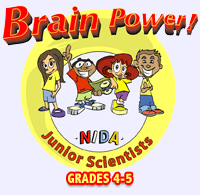 |

What is Addiction? (Module 6)
Procedures
1. Tell the students that this is the final module in the program. Their goal is to try to pull together material they learned in earlier modules to draw some conclusions about drug use.
2. Have the students watch the video. Stop the video at the break. Make sure that each student has all the Instruction Sheets, Fact Sheets, and notes from previous modules, as well as the scrapbooks from Module 1.
3. Tell students that their challenge is to add a page to their scrapbooks from Module 1to reflect what they have learned during the program. These pages will serve as a before and after summary and will assess their growth and understanding over time about the brain and drugs. Based on what they know now, how would they depict people drinking and smoking in ads? How would they describe drug use to friends?
4. Give the students class time to modify their scrapbooks. They may choose to find new pictures to put in, or they may simply change what they say about the images.
5. Finish watching the video. When the video is over, bring the class back together to share their scrapbooks. What conclusions did the students come to? Did most students change their ideas about drugs and how they should be depicted in the media?
6. Divide the class again into two groups (A and B) and instruct each group to come up with four to six trivia questions about drugs and addiction to ask the other group. Give the students time to come up with questions and then play the game. If students have difficulty coming up with questions on their own, have them use these examples:
- What is it called when a person needs more of a drug to produce the same effect? Answer: tolerance
- What is it called when someone who is addicted to drugs feels bad when not using drugs? Answer: withdrawal
7. One member from Group A should read the question to be answered by Group B. Group B should discuss among themselves before agreeing on an answer. Group B has two options at this point: (1) Group B members can agree on an answer that a group member will announce, or (2) they can ask for a clue from Group A. The point system is explained in the chart below.
How Question is Asked
|
Right or Wrong
|
Points Awarded
|
Group B with no help
|
Right Answer
|
2 points for Group B
|
Group B with a clue from Group A
|
Right Answer
|
2 points for Group B, and
1 point for Group A
|
Group B with no help
|
Wrong Answer
|
No points awarded
|
Group B with a clue from Group A
|
Wrong Answer
|
No points awarded
|
|
8. After all the questions have been asked to both groups, declare the group with the higher number of points the winner. Take the time now to emphasize how collaboration results in more points for both groups in this activity. Explain how scientists benefit from collaboration as well. When researchers work together, they make better progress.
Discussion Questions
1. Discuss what addiction means. Ask whether that piece of information changes their opinions about drug use.
2. Discuss what collaboration means. Ask whether scientists benefit more from competition or collaboration.
|
Module 6 Contents
|
Module 6 Documents
|
|

|

|

|
Ordering Information
This package can be ordered by calling
1-877-NIDA-NIH and request "BPPACK2"
Or it can be ordered online at backtoschool.drugabuse.gov.
|
|
Contact Information
For questions regarding NIDA's Science Education Program and Materials, contact
Cathrine Sasek, Ph.D., e-mail: csasek@nih.gov.
|
|